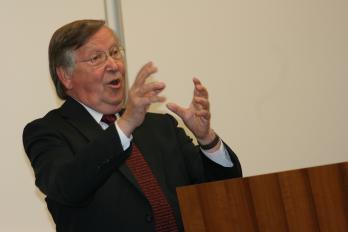Distinguished German Professor Speaks at TJSL
April 21, 2011
Distinguished German Professor Manfred Weiss, who is a major name in international and comparative workplace law circles, lectured at Thomas Jefferson School of Law on April 21, as the special guest of Professor Susan Bisom-Rapp.
Professor Weiss’ very animated and informative presentation was titled “Developments in European Union Social Policy: What the Shift from Hard to Soft Law Means for the Future of EU Employment and Labor Law.”
So that everyone would understand his context, Professor Weiss related history of the European Union and how it evolved from a six nation economic community in 1957 to the present, where there are 27 nations in the EU, and more which aspire to join, including the Balkan countries and Turkey.
As you can imagine, there are many major challenges in getting a heterogeneous group of nations with separate cultures, laws, languages, histories and sovereignty to act as one federated group for the common interest.
Professor Weiss explained that due to political constraints, employment and labor law legislation is rarely if ever passed in the form of regulations, which would automatically apply as laws in the member states. Moreover, several areas of workplace policy are excluded from the jurisdiction of the E.U., which may not legislate upon them. These excluded topics include legislation on strikes and employer lockouts, and minimum wages. Regulations, said Professor Weiss, are the so-called “hard laws.”
Rather, E.U. employment and labor laws typically take the form of directives, flexible, more general legislative commandments to the member states. Considered “hard laws,” directives must be transposed into national law by the member states but their generality allows countries to implement them in ways that in theory will not produce frictions with national law. Although a member state’s efforts at transposing a directive are reviewable by the European Court of Justice, the court with the exclusive power to interpret E.U. law, the transposition process results in a lack of uniformity in employment and labor law in the EU member states.
Even so, and acknowledging the difficulty of legislating in the E.U., a great many workplace directives are in place, on subjects such as occupational health and safety, atypical work, protection of workers where corporate restructuring takes place (involving for example layoffs, known as “collective redundancies” in the E.U.), worker rights of information and consultation, and employment discrimination. Without the E.U., and the employment and labor law directives, the workplace law in the member countries would look quite different.
But, said Professor Weiss, this is a system of fragmentary and unsystematic legislation. Over time, as an addition to this unsystematic system, “soft law” mechanisms have developed. Soft law consists of E.U. instruments that are not legally binding but put pressure on the member states to take action. Examples of E.U. soft law efforts are: 1) the process of social dialogue which results in non-binding collective framework agreements; 2) European Employment Policy, which is developed via the Open Method of Coordination, and involves bench-marking and identifying member state best practices; and 3) the Lisbon Strategy (2000-2010) and Europe 2020 Strategy (2010-2020).
According to Professor Weiss, it is increasingly difficult to get the member nations to agree on hard law, and he says the real question is: “Does it mean this kind of soft law can be a kind of substitute for hard law?” Although there are divergent schools of thought on this, Professor Weiss says he is “half optimistic that the soft law strategy will lead to hard laws eventually.”
The well-attended event was co-funded by the Center for Global Legal Studies and the Center for Law and Social Justice, and co-sponsored by the International Law Society.





